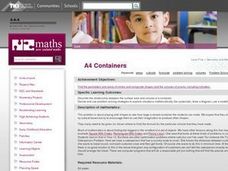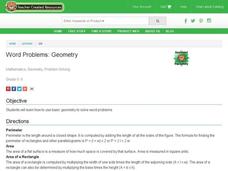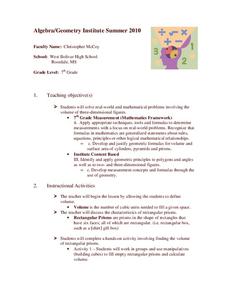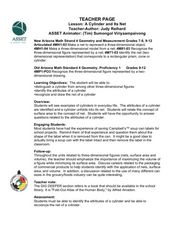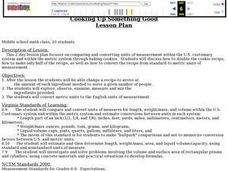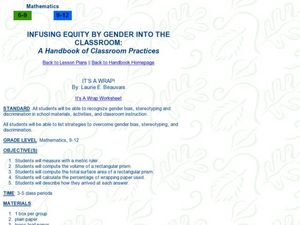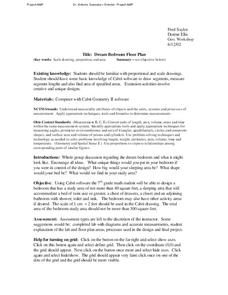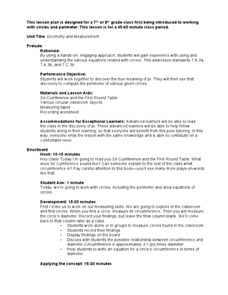American Statistical Association
Exploring Geometric Probabilities with Buffon’s Coin Problem
Scholars create and perform experiments attempting to answer Buffon's Coin problem. They discover the relationships between geometry and probability, empirical and theoretical probabilities, and area of a circle and square.
Curated OER
A4 Containers
Fifth graders determine which container made from a single sheet of paper has the greatest volume. They look the solutions made by three different students before working on their own examples.
Curated OER
Area of Parallelograms
Seventh graders review the process of finding the area of a rectangle and complete a couple of examples as a class. They discuss what a parallelogram is and what the formula would be for finding its area. They listen to an explanation...
Mathematics Assessment Project
Designing 3d Products: Candy Cartons
Wouldn't it be great to work in a candy factory? Learners get their chance as they first design a carton for a candy that meets certain requirements. They then examine and analyze nets and explanations in sample student responses.
Curated OER
Penny's Box
Students need to be able to calculate the volume and surface area of a cuboid as well as present a systematic list of results in order to justify the minimum case. The use of three factors of 100 is also important.
Curated OER
New Boxes from Old
Ninth graders take a rectangular box (e.g., a cereal box) and cut it up to make a new, cubical box with the same volume as the original. In so doing, they will discover that because the cubical box has less surface area than the...
Curated OER
Word Problems: Geometry
Students solve word problems by using basic geometry. In this geometry lesson, students use geometric formulas to find the perimeter, area, and volume of objects. Students complete a worksheet.
Curated OER
Measurements
Seventh graders solve word problems involving real world situation. For this geometry lesson, 7th graders solve problems related to volume. They apply the formulas taught in geometry.
Curated OER
A Cylinder and Its Net
Young scholars sketch the nets for given polygons and cylinders. In this geometry lesson, students find the measurements that correspond with prisms, cones and cylinders. they identify parts of three-dimensional shapes.
Curated OER
Cones, Cylinders, Spheres
Students classify polygons by name and shape. In this geometry instructional activity, students identify the lateral surface of each conic. They differentiate between cones, cylinders and spheres.
Curated OER
Geometry Journal: Classifying Solids
In this geometry worksheet, 10th graders respond to journal prompts related to prisms and classifying solid shapes. The two page worksheet contains nine questions. Answers are included.
Curated OER
Cooking Up Something Good
Students compare and convert units of measurement within the United States customary system and within the metric system by baking cookies. Students discuss how to double the cookie recipe, how to make only half of the recipe, and how to...
Pennsylvania Department of Education
A Geometric Scavenger Hunt
Fifth graders connect their knowledge of polygons and polyhedrons. For this geometric shapes lesson, 5th graders identify and classify two- and three-dimensional objects. Students construct a polyhedron out of polygons and describe their...
Curated OER
Infusing Equity in the Classroom by Gender
Students investigate the idea of gender descrimination in the classroom. In this algebra lesson, students collect data in stereotyping, and gender bias in the classroom, school materials and activities. They graph and analyze their...
Curated OER
Using Concept Maps to Design 3D Spheres
High schoolers create three dimensional shapes using concept maps. In this geometry lesson, students investigate the impact of mental schemas on humans. They collect data on this topic and plot their data on a coordinate plane.
Curated OER
The Circle's Measure
Students explore circumference and diameter. For this math lesson, students apply their knowledge of circumference and diameter to solve mathematical riddles. Students apply this knowledge to find circumference and diameter of various...
Curated OER
Dream Bedroom Floor Plan
Students build and apply concepts of geometry. In this geometry lesson, students create a building using proportions and scale drawings. They use Cabri technology to create a virtual drawing first.
Curated OER
Dream Bedroom Floor Plan
Students construct using Cabri software. In this geometry lesson, students convert between units and apply the correct measurements to build objects. They create the room virtually and manipulate the shapes to the desired measurements.
Curated OER
Geometry and Measurement
Learners view a right triangle displayed by the teacher. Students measure legs and the interior angles of the triangle. They look for a pattern or relationship between the legs and angles. Learners use pegboards and string to create more...
Better Lesson
Better Lesson: Covering and Filling: Surface Area & Volume of Rectangular Prisms
Students apply their knowledge of surface area and volume to solve some problems for a box company. This lesson contains a detailed lesson plan, video explanations, rubrics, group work guidelines, slides containing problems, and...
University of Texas
Inside Mathematics: Building Blocks [Pdf]
This task challenges students to demonstrate understanding of area, surface area and volume.
Better Lesson
Better Lesson: Prism or Pyramid?
Sixth graders explore the faces, bases, edges, and vertices of prisms and pyramids to help develop the concepts of volume and surface area.
TeachEngineering
Teach Engineering: Boxed in and Wrapped Up
Students find the volume and surface area of a rectangular box (e.g., a cereal box), and then figure out how to convert that box into a new, cubical box having the same volume as the original. As they construct the new, cube-shaped box...
Illustrative Mathematics
Illustrative Mathematics: 8.g Shipping Rolled Oats
For this task, 8th graders must determine the optimal dimensions of a cardboard box that will hold six cylinders of oats. To do this, they need to make surface area and volume calculations. Aligns with 8.G.C.9.



